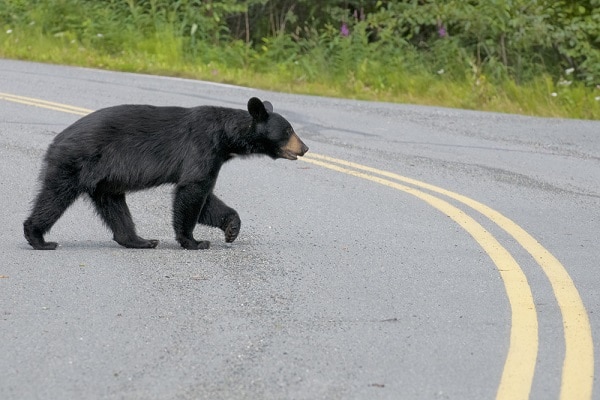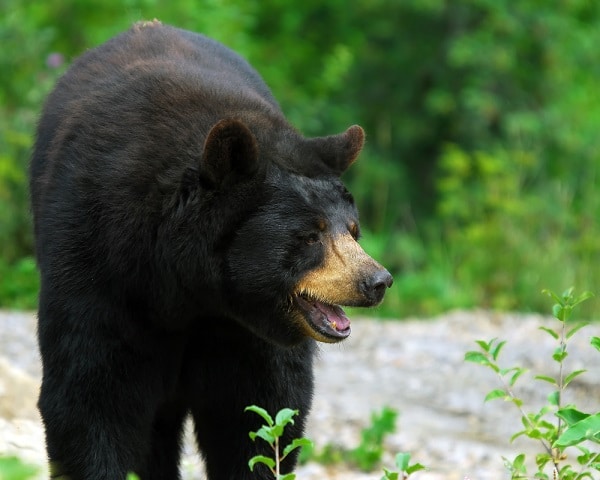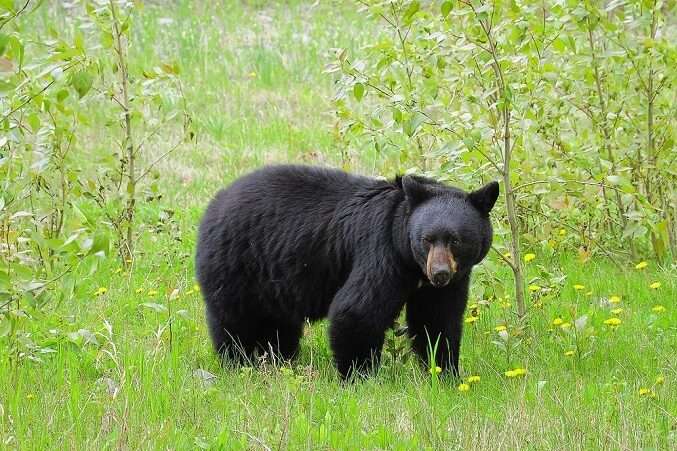Black bear sightings have steadily increased in Bergen County in recent years, according to data from the New Jersey Department of Environmental Protection (NJDEP). As of late September 2024, 59 bear-related incidents were reported in the county—up from 43 during the same period in 2023. While year-over-year changes are not uncommon, NJDEP officials note that seasonal food availability, bear behavior, and increased public awareness can all impact reporting patterns.
Statewide Trends Show Growing New Jersey Bear Population
Across New Jersey, the trend is consistent. According to the NJDEP, black bear complaints and sightings have risen over time, with bear-related activity now being reported in all 21 counties. The agency estimates that New Jersey’s black bear population—once largely limited to northwestern counties—has expanded significantly. The population has grown from approximately 1,500 bears in 2018 to over 3,000 in recent years, with projections suggesting it could surpass 4,000 by 2026.
This growth, coupled with suburban development in formerly wooded areas, means that bear-human interactions are becoming more frequent—and not just in remote or rural areas.
Bear Sightings in Bergen County Suburbs
In Bergen County, sightings have been confirmed in towns like Paramus, Teaneck, New Milford, and Bogota, where residential neighborhoods border parks, wooded corridors, and waterways. These bears are often drawn by unsecured trash, pet food, bird feeders, or outdoor grills.
Whether you’re hiking through Ramapo Valley County Reservation or enjoying a quiet backyard barbecue, the potential for bear encounters has become part of life in northern New Jersey.
Why Responsible Coexistence Matters
While black bears are typically not aggressive toward humans, they are large, strong animals capable of causing injury if they feel cornered or are protecting food or cubs. As more bears move into suburban settings, there’s an increased need for public education and prevention.
Improperly stored garbage, for example, is one of the top reasons bears return to neighborhoods—and once a bear becomes food-conditioned, it may be euthanized to prevent further risk. That’s why learning how to minimize attractants and respond to bear encounters is essential for protecting both people and wildlife.
Black Bears Are Dangerous

Actual black bear attacks on people are rare, but they can happen. In 2014, a Rutgers University student died after being attacked by a black bear while hiking in West Milford. This was the first deadly black bear attack reported in New Jersey in 150 years. According to the NJ Division of Fish & Wildlife, black bears rarely attack when confronted by humans. They typically limit themselves to making mock charges, emitting blowing noises, and swatting the ground with their forepaws. However, never assume you are safe and take precautions to avoid black bears.
Should a black bear attack, victims have a better chance of surviving by fighting back, according to the New Jersey Division of Fish and Wildlife. Female black bears do not display the same protectiveness to their cubs as other bears and will seldom attack humans in their vicinity. Most black bear attacks in the United States occur in forested parks, usually near campgrounds, where bears become habituated to human contact and food sources.
Do Black Bears in NJ Hibernate?
Don’t be too surprised if you spot a black bear ambling about during the winter months. So do black bears hibernate? Not exactly.
According to black bear biology and behavior information provided by the NJ Division of Fish and Wildlife, black bears in New Jersey typically enter a state of winter dormancy called torpor which is different from true hibernation. While in this State, a bear’s heart and respiratory rate slow, and the body temperature drops. Black bears in New Jersey will begin entering dens in the fall. Impregnated females typically enter dens in late October. Males may enter dens as late as December. Black bear dens come in many different forms and settings, including ground nests, hollow trees, rock cavities, and even nestled beneath houses and other buildings. Black bears in New Jersey may leave their dens searching for food on mild winter days.
What to Do if You Encounter a Black Bear

Black bears are generally cautious of humans and tend to avoid them. However, there were instances of aggressive bear behavior at Ramapo Reservation in Mahwah, New Jersey, that led to the closure of the area for an extended period about a decade ago.
If you encounter a black bear, the New Jersey Department of Environmental Protection Division of Fish & Wildlife recommends that you follow the following safety tips:
• Avoid direct eye contact, which a bear may perceive as a challenge. Never run from a bear. Instead, slowly back away.
• To scare the bear away, make loud noises by yelling, banging pots and pans, or using an air horn. Make yourself look as big as possible by waving your arms. If you are with someone else, stand close together with your arms raised above your head.
• The bear may utter a series of huffs, make popping jaw sounds by snapping its jaws and swat the ground. These are warning signs that you are too close. Slowly back away, avoid direct eye contact, and do not run.
• If a bear stands on its hind legs or moves closer, it may be trying to get a better view or detect scents in the air. It is usually not threatening behavior.
• Black bears will sometimes “bluff charge” when cornered, threatened, or attempting to steal food. This can be very frightening for humans but do your best to stand your ground, avoid direct eye contact, then slowly back away and do not run.
• If the bear does not leave, move to a secure area.
• Immediately notify the DEP’s 24-hour, toll-free hotline at 1-877-WARN DEP (1-877-927-6337)
• Families living in areas with high black bear populations such as Mahwah, Oakland, Ringwood, or Wayne should have a “Bear Plan” for children with whistles, air horns, and an escape route.
• If a bear enters your home, provide it with an escape route by propping all doors open.
• If a black bear does attack, fight back.
• Never feed or approach a bear.
• Try to remain calm.
• Make the bear aware of your presence by speaking assertively, singing, clapping your hands, or making other noises.
• Make sure the bear has an escape route.
Black bears have the potential to be dangerous if they feel threatened or provoked. It’s important to give them space and avoid surprising them. If you encounter a black bear, it’s best to make noise and slowly back away.
The New Jersey Department of Environmental Protection, Division of Fish and Wildlife, and Division of Parks and Forestry provide helpful information about black bears and living or visiting “Bear Country” in New Jersey. The convenient Be Bear Aware two-page fact sheet provides advice and safety tips for hiking, fishing, and camping in Bear Country and helpful tips on avoiding bears and staying safe if you live in Bear Country.













